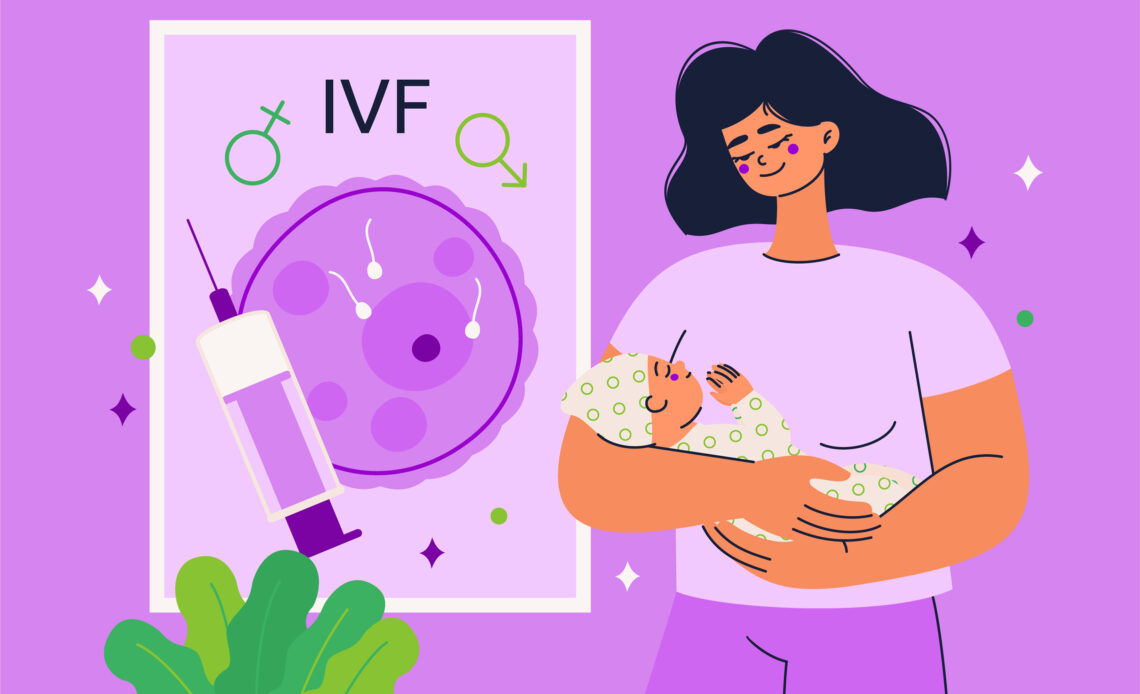The journey through in vitro fertilization (IVF) can be both emotionally and physically demanding. While medical advancements have significantly improved the success rates of IVF, the role of lifestyle and diet in optimizing outcomes is gaining increasing attention. Proper nutrition and a healthy lifestyle can enhance fertility, improve the chances of a successful pregnancy, and support overall well-being during the IVF process. This blog explores the critical impact of dietary choices, exercise, and lifestyle habits on IVF success, providing valuable insights and practical tips for those navigating this complex yet hopeful path to parenthood.
Factors affecting IVF success rates
Are you considering in-vitro fertilization (IVF) to start or expand your family? If so, you’re not alone. IVF has become a widely embraced and effective fertility treatment option for couples facing infertility. Yet, did you know that lifestyle and diet can play a significant role in the success of IVF?
The success rate of IVF can be influenced by a variety of factors, both within and outside the control of the individual. Medical factors such as the age of the woman, the quality of the eggs and sperm, and the presence of any underlying medical conditions can all impact the chances of a successful IVF cycle. Additionally, the specific protocols and techniques used during the IVF process can also affect the outcome.

However, what many people may not realize is that lifestyle and dietary choices can also have a significant impact on the success of IVF. Factors such as body weight, physical activity, smoking, and nutritional intake can all influence the body’s ability to respond to fertility treatments and increase the chances of a successful pregnancy. By understanding how these lifestyle and dietary factors can impact IVF success, individuals can make informed decisions to optimize their chances of conception.
The role of lifestyle in IVF success
Maintaining a healthy lifestyle is crucial for improving the chances of IVF success. Studies have shown that individuals who are overweight or obese have a lower chance of successful IVF outcomes compared to those with a healthy body weight. Excess weight can lead to hormonal imbalances, inflammation, and other metabolic issues that can negatively impact fertility and the response to fertility treatments.
In addition to weight, physical activity and exercise can also play a significant role in IVF success. Regular exercise improves ovarian function, increases blood flow to the reproductive organs, and reduces inflammation, all of which enhance the body’s response to fertility treatments. Conversely, a sedentary lifestyle leads to poorer IVF outcomes.
Another lifestyle factor that can impact IVF success is smoking. Numerous studies have demonstrated that smoking can have a detrimental effect on fertility, reducing the chances of successful IVF outcomes. Smoking can damage the quality of eggs and sperm, impair the uterine lining, and increase the risk of miscarriage. Quitting smoking before starting IVF treatment can significantly improve the chances of success.
The importance of a healthy diet during IVF
In addition to lifestyle factors, the role of diet in IVF success cannot be overstated. A balanced and nutrient-rich diet can provide the necessary building blocks for healthy egg and sperm development, as well as support the body’s overall reproductive function.
Several studies have shown that individuals who consume a diet rich in antioxidants, such as vitamins C and E, have a higher chance of successful IVF outcomes. Antioxidants can help protect the eggs and sperm from oxidative stress, which can impair their quality and function. Additionally, a diet high in omega-3 fatty acids, found in foods like fatty fish, has been linked to improved embryo quality and increased pregnancy rates in IVF cycles.

Folate, a B-vitamin essential for cell growth and development, is also crucial for IVF success. Adequate folate intake improves egg and embryo quality and reduces the risk of neural tube defects in the developing fetus. Doctors often advise women planning to undergo IVF to take a prenatal vitamin containing folic acid to ensure they meet their increased folate needs.
Specific foods and nutrients that can improve IVF success
Beyond the general importance of a healthy diet, there are specific foods and nutrients that have been shown to have a positive impact on IVF success. For example, research has suggested that a diet rich in fruits and vegetables, which are high in antioxidants, can improve the quality of eggs and embryos, leading to higher pregnancy rates.
Likewise, foods that are high in omega-3 fatty acids, such as salmon, sardines, and walnuts, have been linked to improved embryo quality and increased chances of successful implantation. These healthy fats can help reduce inflammation and support the development of the uterine lining, which is crucial for embryo implantation.
Certain dairy products, such as full-fat yogurt and cheese, have also been associated with improved IVF outcomes. These foods are rich in calcium, which is essential for the proper functioning of the reproductive system, and they may also contain beneficial probiotics that can support gut health and overall fertility.
Lifestyle changes to support IVF success
Given the significant impact that lifestyle and dietary factors can have on IVF success, it’s essential for individuals undergoing fertility treatment to make conscious efforts to adopt healthier habits. This may involve a combination of weight management, increased physical activity, smoking cessation, and dietary modifications.
For those who are overweight or obese, achieving a healthy body weight through a combination of a balanced, calorie-controlled diet and regular exercise can greatly improve their chances of IVF success. Excess weight can interfere with the body’s hormonal balance and reduce the effectiveness of fertility treatments, so losing even a few pounds can make a significant difference.
Incorporating regular physical activity into one’s routine is also crucial for IVF success. This can include a variety of exercises, such as brisk walking, swimming, or yoga, which can help improve blood flow, reduce inflammation, and support overall reproductive health. Aim for at least 30 minutes of moderate-intensity exercise most days of the week.
Tips for managing stress during IVF treatment
In addition to the physical aspects of IVF, it’s important to address the emotional and psychological factors that can impact the success of the treatment. The IVF process can be incredibly stressful, with individuals often experiencing a rollercoaster of emotions throughout the various stages of the treatment.

Effective stress management strategies can play a crucial role in supporting IVF success. Techniques such as meditation, deep breathing exercises, and mindfulness practices have been shown to reduce stress and anxiety levels, which can positively influence the body’s response to fertility treatments.
Seeking support from a mental health professional, such as a therapist or counselor, can also be beneficial for individuals undergoing IVF. These professionals can provide coping strategies, emotional support, and guidance on managing the psychological aspects of the fertility journey.
The impact of exercise on IVF success
As mentioned earlier, regular physical activity can have a significant impact on IVF success rates. Exercise can improve various aspects of reproductive health, including ovarian function, blood flow, and inflammation levels.
Studies have shown that individuals who engage in moderate-intensity exercise, such as brisk walking, swimming, or cycling, have a higher chance of successful IVF outcomes compared to those who lead a sedentary lifestyle. The benefits of exercise may be due to its ability to regulate hormones, enhance blood flow to the reproductive organs, and reduce the risk of conditions like polycystic ovary syndrome (PCOS), which can negatively impact fertility.
It’s important to note that the type and intensity of exercise can also play a role in IVF success. High-intensity or excessive exercise may not be beneficial, as it can potentially disrupt the body’s hormonal balance and lead to increased stress levels. Therefore, it’s crucial to find a balance and engage in moderate, regular physical activity that supports overall reproductive health.
Other lifestyle factors to consider for IVF success
While the factors discussed so far (weight, diet, exercise, and stress management) are crucial for IVF success, there are other lifestyle considerations that can also impact the outcome of fertility treatments.
For instance, exposure to environmental toxins, such as pesticides, heavy metals, and endocrine-disrupting chemicals, has been linked to reduced fertility and poorer IVF outcomes. Individuals undergoing IVF may benefit from reducing their exposure to these harmful substances by choosing organic produce, filtering their water, and using natural personal care products.
Additionally, the quality of sleep can also play a role in IVF success. Adequate, high-quality sleep is essential for maintaining hormonal balance, reducing inflammation, and supporting overall reproductive health. Individuals undergoing IVF should aim for 7-9 hours of sleep per night and practice good sleep hygiene, such as maintaining a consistent sleep schedule and creating a relaxing bedtime routine.
Furthermore, the use of certain medications, such as over-the-counter pain relievers or prescription drugs, can potentially impact fertility and IVF outcomes. It’s crucial for individuals to discuss any medication use with their fertility specialist to ensure that it does not interfere with the IVF process.
Conclusion
In conclusion, the success of in-vitro fertilization (IVF) is not solely dependent on medical factors; lifestyle and dietary choices also play a crucial role. By understanding the impact of factors such as body weight, physical activity, smoking, and nutritional intake, individuals can make informed decisions to optimize their chances of successful IVF treatment.
Adopting a holistic approach that addresses both the physical and emotional aspects of the fertility journey is essential. This may involve achieving a healthy body weight, engaging in regular moderate exercise, quitting smoking, and following a nutrient-rich diet that supports reproductive health. Additionally, managing stress through techniques like meditation and seeking support from mental health professionals can also contribute to improved IVF outcomes.
Remember, every individual’s fertility journey is unique, and what works for one person may not work for another. It’s important to work closely with your fertility specialist to develop a personalized plan that addresses your specific needs and goals. By making lifestyle and dietary changes to support your fertility, you can increase your chances of achieving your dream of starting or expanding your family through successful IVF treatment.


